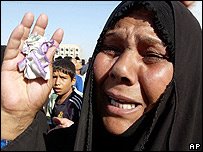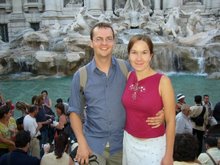This is my talk for our annual memorial service which takes place in St Martin's on October 29th 2006 at 6.30pm. Part of this talk has been inspired by the Nooma video 'Matthew' by Rob Bell, and I feel it is right that I acknowledge this at the start.
---------------------------------
C S Lewis, who was born in 1898 and died in 1963, is renowned as being one of the greatest Christian writers of the last century. His works have been translated into over 30 languages, and 43 years after his death he is still on the best sellers list. He wrote many books, but he is most famous for his children’s series, The Chronicles of Narnia, which has sold over 100 million copies.
One of Lewis’ less well known books is called ‘A Grief Observed’, which is based on a series of journals C S Lewis wrote shortly after the death of his wife Joy Gresham from cancer at the age of 45. It is an extremely honest and moving account of the pain C S Lewis endured after his wife’s death.
Anyone who has experienced the pain of bereavement will I think be able to identify with what Lewis writes. This is what he wrote shortly after the death of Joy. “No one ever told me that grief felt so like fear… the same fluttering in the stomach, the same restlessness, the yawning… At other times it feels like being mildly drunk, or concussed. There is a sort of invisible blanket between the world and me. I find it hard to take in what anyone says. Or perhaps, hard to want to take it in… I dread the moments when the house is empty… There are moments, most unexpectedly, when something inside me tries to assure me that I don’t really mind so much, not so very much, after all… I was happy before I ever met Joy. People get over these things. Come, I shan’t do so badly. One is ashamed to listen to this voice but it seems for a little to be making out a good case. Then comes a sudden jab of red-hot memory and all this ‘commonsense’ vanishes like an ant in the mouth of a furnace.
All of us here tonight, have been affected by bereavement at one time or another. For some here, this bereavement was very recent, and the raw emotions that CS Lewis writes about, may reflect how you feel today. For others, the bereavement may have been some time ago, but even with the passage of time, nothing fully takes away that sense of loss, instead you learn to live with it.
Christians have always believed that there is hope in death as in life, and that there is new life in Christ over death. But even if you share this hope, the pain of death is no less real. One of the things that C S Lewis wrestled with was the sense of having been abandoned by God. In the days after his wife’s death he wrote “Where is God?” for Lewis it felt as though God had closed the door in his face, and that he had been abandoned.
But this is something that Jesus himself felt, when he cried out from the cross, ‘Father why have you abandoned me?’ Where is God when it hurts?
There answer to that question in part lies in the cross itself. The cross throughout history was a symbol of suffering and death, but for Christians it has become a symbol of hope and victory in the face of death. It is through the cross Jesus took on and defeated death. At his birth Jesus was given a special name, Emmanuel, which means God with us. And it is on the cross that we see, Emmanuel, God with Us, suffering with us and for us. God shares our pain, and he weeps with us.
Jesus himself wept at the death of his friend Lazarus. Several days after Lazarus had died Jesus goes to Lazarus’ village, to where his family and friends are mourning their loss. And Lazarus’ sisters say to Jesus, if you had been here earlier, maybe this wouldn’t have happened. And Jesus enters into this big giant mess, and we are told that he was deeply moved in his spirit. Somewhere deep down he connects with all this mess, and then we are told, Jesus wept. He feels all this pain and loss, and enters into it. And he lets the full force of the moment hit him, he doesn’t hide from it, or ignore it, he faces it full on.
In life we cannot avoid pain, or try to ignore it, expecting it to go away. We have to let it out, or else it builds up inside of us. If Jesus wept, then we need to as well.
We all have a choice about how we respond to the pain of loss and about the kinds of people we are, and the kinds of people we’re becoming. We have a choice whether or not we’re going to become bitter. There is a woman in the Bible named Naomi, and she loses her husband and her two sons, and she says, “Don’t call me Naomi anymore, call me Mara.” The word Mara is the Hebrew word for ‘bitter’. “Don’t call me Naomi. Call me bitter." A man named Job in the Scriptures loses everything, children, houses and possessions, and his wife says “Job, are you still holding on to you integrity? Curse God and die!” She becomes consumed with her bitterness. And if we don’t’ acknowledge this choice, if we allow a bit of bitterness in, it will take over. Or sometimes it is not bitterness that we feel, but a sense of guilt. “If only I would have done this, that wouldn’t have happened. If only I would have been this way, if I would have done something differently” And so we can become racked with guilt, and it can seep in and become part of us and we aren’t even aware of it. Don’t let it happen.
In one of the psalms the writer pours out his pain and says to God, “You’ve made me see trouble. You’ve made me see troubles, many and bitter, but you will restore me again.”
It’s easy when we suffer loss, for whatever it is we’ve lost to become the centre of our life. We had them, and now they’re gone. And so there is this giant hole where they once were, and it becomes all we can think about. And what happens in the process is, our whole life becomes what we don’t have, and we lose out on what we do have.
Bereavement always leaves a great hole in our lives, our hearts will never be the same again, but we will recover.
The first Christians spoke about a day in the future when God would restore everything – you, me, everything in heaven and on earth. They talked about how there would be no more weeping or sorrow, nor more death or pain. I find great hope in that.
So may you realise that Jesus wept, and may you realise that God is with you, fully present, grieving your loss… but also restoring. And in that, may we find hope.
 So what do these figures reveal?
So what do these figures reveal?


